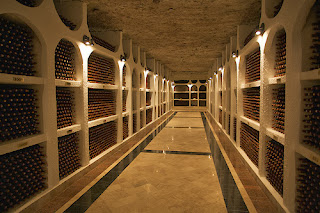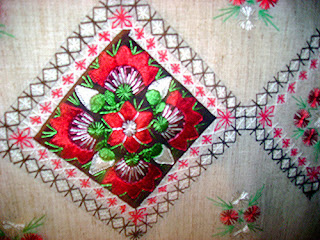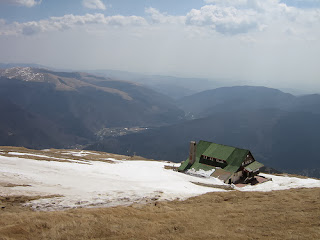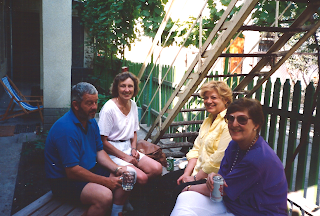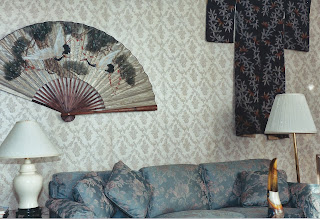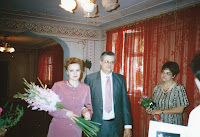 |
| Map of Transnistria from www.turkey-visit.com |
Transnistria, a sliver of land at the eastern border of Moldova, right next to the Ukraine, wanted to be part of Russia, not Moldova, when the former Soviet Union broke apart. Refusing to assimilate into Moldova, Transnistria continued to use the Russian ruble even after Russia had issued new rubles and stopped accepting the old-style currency as legal tender. The Transnistrians added a postage stamp to the Russian rubles to indicate they were
their currency. Since the collapse of the Soviet Union, Russian troops have been present in Transnistria. While we were in Moldova, General Alexander Lebed was in command of the Russian 14th Guards Army in Moldova which was involved in skirmishes in Transnistria and another semi-autonomous region, Gaugazia.
The Organization for Security and Cooperation in Europe (OSCE) has had a presence in Moldova since the early 1990s, charged with facilitating a negotiated settlement between Moldova and Transnistria. At the time we were in Moldova, the ambassador from the OSCE to Moldova was a Canadian. One weekend, he, his wife, one of his local staff, Oksana, Ambassador Pendleton, Alex, and I set off for a relaxing few days in Odessa, on the Black Sea coast of the Ukraine. We left Friday afternoon in two cars, the OSCE ambassador, his wife and Oksana in one, Ambassador Pendleton, Alex, and I in the other. The OSCE ambassador's car was the lead car since Oksana was to be our translator for the trip. She was to explain to the guards at the Transnistrian border, which the U.S. government did not recognize, why we needed to be given speedy and unimpeded passage through Transnistria to the Ukraine.
 |
Alex and Ambassador Pendleton in front of the
Odessa sanitarium |
Oksana had been a university student in Odessa and she was very eager to show all of us what Odessa had to offer. Her initial responsibility, getting us through the Transnistrian border, was not a problem as Ambassador Pendleton was waved through without having to stop. Once we reached Odessa, we checked in at a private sanitarium at the edge of the city. The name conjured up visions of patients with tuberculosis or schizophrenia, but Oksana explained it was a place that offered a relaxing and calming setting and was very desirable for weekend stays.
We didn't spend much time there. That evening we headed for a meal at a restaurant overlooking the coastline and beach. The restaurant was full of very well-dressed and apparently cosmopolitan young couples, some of whom looked as though they had just walked out of the
Hotel Sebaco's casino. There was music and dancing, although we chose to remain spectators as the fashionably dressed couples filled the dance floor.
 |
Image of the Potemkin stairs in Odessa by jakobmeils,
via Flickr.com |
The next day we toured several museums, many of them with a strong military slant. We also went to see the Potemkin stairs, originally 200 steps leading from the city situated on a high steppe plateau to the harbor. That evening we went to a concert where one of the most noticeable acknowledgements of the change in the government was the hole in the flag where the hammer and sickle had been. After the concert, Oksana suggested we go to a hotel that was well known for its entertainment at the bar. As she had done at nearly every other stop, she recommended that we not park directly in front of the location we intended to spend our time. Instead, she had the OSCE ambassador drive around the corner from the hotel where she located two parking spots so that the two cars would be parked one in front of the other. It may have been that desire that the two cars remain close to one another than led her to make the recommendation. We didn't ask; we just wondered.
The next morning, Oksana recommended we have breakfast at a famous downtown restaurant before we headed a short distance out of town to see another Ukrainian Black Sea site. At this location, there were plenty of parking spaces directly in front of the restaurant which also had a very wide sidewalk where others were parking their cars. But instead, Oksana again took us around the corner to park the two cars and we then walked back to the restaurant. At the end of the meal, we walked back to the corner where we expected to see the cars to our right, but it was immediately obvious that something was wrong. There was only one car on the street, Ambassador Pendleton's Honda. The OSCE ambassador's Lada was missing. Instead of spending a short time at the other site after which we planned to travel back through Transnistria, arriving at the border while it was still daylight, we ended up back at the restaurant where we had had breakfast and Oksana called the police.
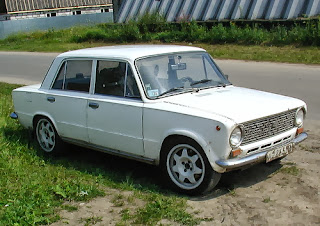 |
| Image of a Lada by SergeyRod, via Flickr.com |
Gasoline was in very short supply in all of the former Soviet Union at that time, so when Oksana got through to the police, she was asked to arrange to pick up the policeman who would investigate the missing vehicle. Ambassador Pendleton, the OSCE ambassador, and Oksana headed out to pick up the policeman, leaving the OSCE ambassador's wife, Alex, and me behind.
Once the policeman was on site, he seem optimistic that they would be able to find the ambassador's car. He recommended that we just wait for awhile. In the meantime, Ambassador Pendleton, the OSCE ambassador, Oksana and the policeman made a few other stops to file reports and investigate options. The confidence of the policeman reminded me of the
policemen in Barbados who asked what might have been called leading questions in a U.S. courtroom as they investigated the attempted theft of the Canadian High Commissioner's son's bicycle in Bridgetown.
By 3 p.m., Ambassador Pendleton was concerned that if we didn't leave soon, we would arrive at the Transnistrian border at dusk. She did not want to be confronting the informal Transnistrian militia under any disadvantage, so she began to press for the six of us squeezing ourselves into her car so that we could return. Oksana assured her that she could get us past the border without a problem, so waiting a little longer would be fine.
So we waited. By 5 p.m., Ambassador Pendleton decided it was already getting too late for us to wait any longer. She insisted that the six of us get into the car and head back. But Oksana and the OSCE ambassador were unwilling to give up. Instead of getting into Ambassador Pendleton's car, they agreed that the four of us - Ambassador Pendleton, Mrs. OSCE Ambassador, Alex, and I - should head back to Moldova. Oksana gave Ambassador Pendleton directions for what she called a short-cut so that we would get to the border more quickly.
The four of us left, now minus the only Russian speaker among us, and headed for the border as the sun sank lower and lower. By the time we reached the border, we realized that the guards there, most of them very young men without any identifiable uniforms, had been standing in the sun while drinking all afternoon. When the car stopped, the guard who approached the ambassador stumbled as he walked towards the driver side window. A rifle was slung over his shoulder but the other guards were holding onto their rifles by the barrels.
The guard insisted the ambassador get out of the car. She tried to speak with him in Romanian, but that didn't work. He motioned for her to go to the back of the car and then he pointed to the trunk, indicating he wanted her to open it. She did. But when he started opening the suitcases in the trunk she pushed his hands out of the way and told him he didn't have any right to inspect anything in her car because we were all diplomats and her car had diplomatic plates on it. She got back into the car, put the car in gear and drove off. The rest of us slunk down into the seats so our heads were below the level of the back window.
It took a few minutes before we all exhaled.





